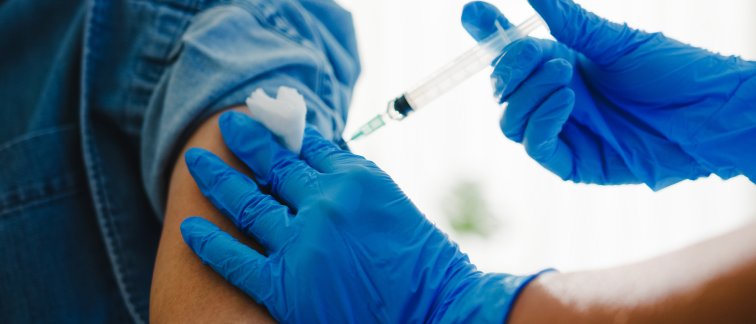According to experts, it is a good idea to set up a limited vaccination program against the mpox virus. With global warnings about a new outbreak of a more dangerous variant, the importance of such a program has grown. Professor Henry de Vries, theme leader of the AI&I Infectious Diseases Public & Global Health program, shares his vision.
The World Health Organization (WHO) of the United Nations has declared the outbreak of the mpox virus, formerly known as the monkeypox virus, as an international health risk. This is due to the outbreak of a new variant of the virus that is likely more virulent and lethal.
More dangerous variants
Henry de Vries, Professor of Skin Infections and Dermatologist at Amsterdam UMC and the Public Health Service of Amsterdam (GGD), shares the WHO's concerns. Prof. de Vries: ‘The 1a variant is likely more dangerous than the one from 2022.’ Over 500 deaths from the virus have been reported in Africa, with children and pregnant women being the most at risk. The virus primarily spreads through young children, who come into contact with
animals carrying the virus. Recently a new variant (designated 1b) has emerged that mainly spreads via (hetero)sexual contact.
According to Prof. de Vries, it is good that the WHO has issued this advice. ‘It raises awareness, encourages cooperation, and prompts necessary measures such as vaccination or isolation. It also makes vaccines more accessible in Africa, which is in our own interest as well’.
Mpox outbreak in the Netherlands
Two years ago, the previous variant of the mpox virus (variant 2b) also emerged in the Netherlands. The main symptom of the viral infection is a skin rash that appears as red spots, bumps, or blisters. The virus can be transmitted through skin, mucous membrane, and sexual contact. During the last outbreak, it primarily affected homosexual men. This led to a vaccination campaign for specific high-risk groups.
Currently, there is no acute threat in the Netherlands, with few to no cases being reported. ‘The current infections in the Netherlands only concern the earlier variant that was also circulating in 2022. In all cases, the infections were contracted abroad, such as in Southern Europe during vacations’, de Vries explained. 'In the Amsterdam region we see 2 new cases of variant 2b mpox each month'.
Mpox or monkeypox?
During the previous virus outbreak in the spring and summer of 2022, the disease was still known as 'monkeypox'. A few months later, the WHO officially renamed it to 'mpox', to avoid stigma and discrimination associated with the original name.
New vaccination program
Given the new threat, prof. de Vries believes restarting the vaccination program could be worthwhile. ‘In today's globalized world, things can escalate quickly. It only takes one traveler with many contacts.’ The current smallpox vaccines should also work against the new variant, according to Prof. de Vries.
Last year, the Health Council advised, at the request of the Ministry of Health, Welfare, and Sport, to continue the vaccination program for homosexual men with multiple sexual partners.
New variant cannot be ruled out
Prof. de Vries supports the following recommendation. "The advice was to keep offering the vaccine on a low scale. This involves approximately 1500 vaccinations per year. It is much better to maintain this program rather than having no clear vaccination strategy," he emphasized.
In response to questions from EenVandaag, the Health Council stated that the current outbreak underscores the need for vaccinations. However, the Council does not rule out the possibility that a more contagious variant could reach Europe or that the circulating virus could become more transmissible.
Low disease burden due to vaccination
If a more transmissible variant does emerge, the disease burden could be higher than what has been observed so far. ‘All things considered, there is sufficient reason to consider vaccination against mpox for men who have sex with men with high sexual activity’, the committee noted.
Offering this vaccination also has additional benefits, according to the Health Council. ‘Vaccination keeps the disease burden as low as possible and can contribute to the elimination of mpox outside Africa’. The committee expects that it is more efficient to establish a structural program now rather than starting one during a new outbreak.
No additional measures yet
For now, the Netherlands will not take any extra measures following the WHO emergency declaration. This is because the risk is very low, a spokesperson for the Ministry of Health, Welfare and Sport stated. In the Netherlands the smallpox vaccine is still in stock, and Minister Fleur Agema has decided to reserve it for potential use in the Netherlands rather than donating it to African countries with a current mpox outbreak.
In May, State Secretary Maarten van Ooijen informed the House of Representatives that he would leave the decision on the advice for a structural vaccination program to the new cabinet. It is unclear when more information will be available on this matter.
This article is a revised version of an article originally published in Dutch on EenVandaag written by Joost Lammers and Erik van Prooijen. Access the original piece here.
Read our previously published articles about Mpox:
Monkeypox infections are declining, de Vries shares his knowledge with NOS (October 2022)
Monkeypox virus detected in a child in Amsterdam: 'We don't know how he got infected' (July 2022)

